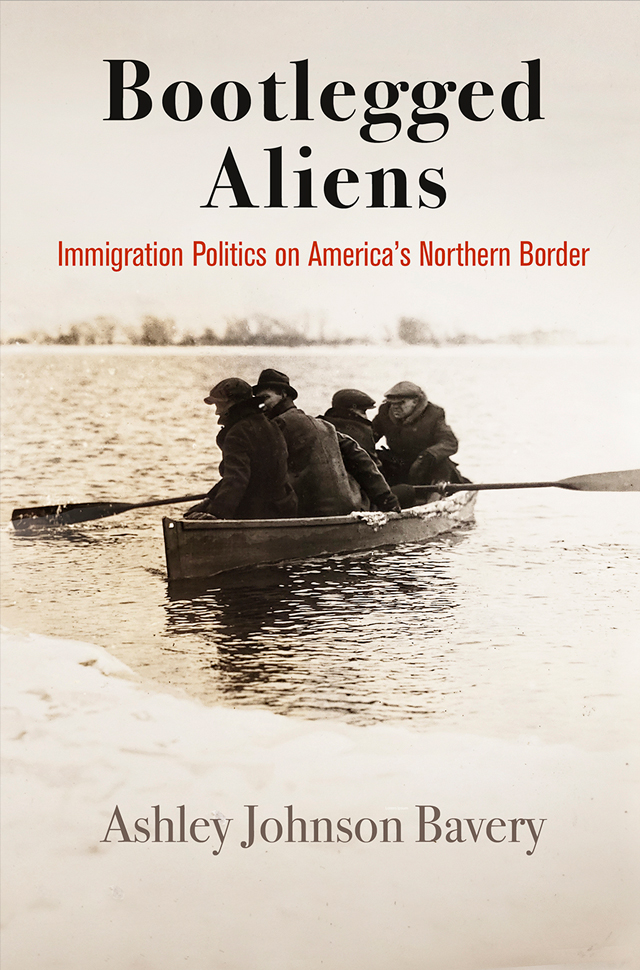Professor Ashley Johnson Bavery Publishes Bootlegged Aliens


Assistant Professor of History Ashley Johnson Bavery’s new book, Bootlegged Aliens: Immigration Politics on America's Northern Border (University of Pennsylvania Press, 2020), explores how undocumented immigration to Detroit, America's epicenter for illegal immigration before World War II, created the framework for America's contemporary immigration system. In the first half of the twentieth century, the border separating the world's automobile capital, Detroit, Michigan, from Windsor, Ontario marked North America's number one site for undocumented immigration, and the migrants in question were European, not Latino or Asian. By bringing the U.S.-Canada border to the larger history of North American immigration, Dr. Bavery uncovers the roots of America's impetus to close its borders to immigration while simultaneously keeping them open to free trade and commerce. Nearly a century before President Donald Trump called for a border wall with Mexico, businesses, politicians, and immigrants on the U.S.-Canada border pushed certain Europeans toward illegal labor in America's automobile industry, helping build a system of policing and deportation that continues on the U.S.-Mexico border today.
Bavery begins in the 1920s to explore how that decade's immigration restrictions launched an era of policing and profiling that excluded America's foreign born from the benefits of citizenship. On the border between Detroit and Windsor, Canada, this process turned certain Europeans into undocumented immigrants, a group the press and policymakers referred to as bootlegged aliens. Over the next decade, deportation and policing practices stigmatized entire communities of ethnic Europeans regardless of their legal status. Moreover, restrictive laws allowed manufacturers to exploit workers in new ways. By the Great Depression, citizenship had become an invisible boundary that excluded hundreds of thousands of laborers from New Deal entitlements. Accepted wisdom suggests that the 1924 Immigration Act had allowed ethnic Europeans to shed ties to their homelands and assimilate into the "melting pot" of American culture by the 1930s. Bavery challenges this perspective, finding that, instead of forging a common culture with their fellow workers, European immigrants coming through Canada to Detroit faced statewide registration drives, exclusion from key labor unions, and disqualification from the Works Progress Administration, the cornerstone of America's nascent welfare state. In the heart of industrial America, Bootlegged Aliens reveals, citizenship was highly contingent.


"Bootlegged Aliens helps us rethink how boundaries of citizenship shifted as the welfare state expanded,” explains Holly M. Karibo, author of Sin City North: Sex, Drugs, and Citizenship in the Detroit-Windsor Borderland. “Ashley Johnson Bavery challenges the common conception that the nativism of the 1920s was largely an outgrowth of right-wing reactionary politics and demonstrates how left-wing politics of the 1920s and 1930s likewise helped build the foundation for nativist sentiments." Tracy Neumann, author of Remaking the Rust Belt: The Postindustrial Transformation of North America, praises Bootlegged Aliens as “an engagingly written history of U.S. immigration policy centered on the experiences of southern and eastern European immigrants in Detroit in the 1920s and 1930s, with special attention to Detroit's position on the U.S.-Canadian border. It appeals to not only scholars but also anyone interested in American urban and immigration history."
Ashley Johnson Bavery joined the History faculty at Eastern Michigan University in 2017, and she teaches courses in twentieth-century United States history, immigration history, U.S. foreign policy, urban history, and the history of Detroit. Bootlegged Aliens is her first book, and her work has also appeared in the Journal of Urban History, Labour/Le Travail, and Reviews in American History. She has started work on a second project that investigates early Muslim immigration to the Midwest. She will give a talk drawing on Bootlegged Aliens in the History Speaker Series on January 28, 2021.

